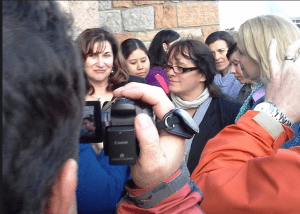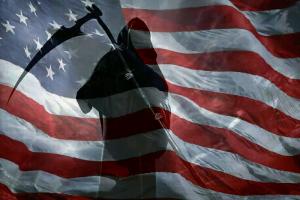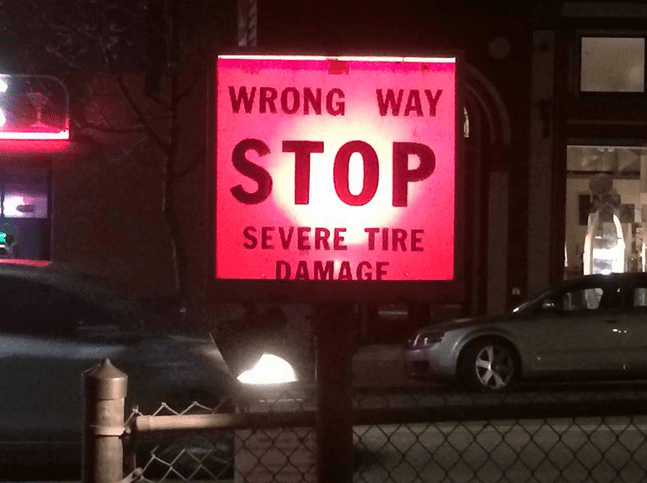 Two nights ago there was a men’s dinner at our home. It was Nathan’s birthday celebration and I had offered to cater a sumptuous blokey kind of meal for him and his friends. Friends who included two bishops, one former bishop and former counselor on the Stake Presidency, and one young men’s president and former high counselor. They were each very eager to hear about the OW action on Temple Square. After a quick good-natured catch up they retired to the dining room to riff on life.
Two nights ago there was a men’s dinner at our home. It was Nathan’s birthday celebration and I had offered to cater a sumptuous blokey kind of meal for him and his friends. Friends who included two bishops, one former bishop and former counselor on the Stake Presidency, and one young men’s president and former high counselor. They were each very eager to hear about the OW action on Temple Square. After a quick good-natured catch up they retired to the dining room to riff on life.
There are several reasons why I love New Zealand men. They are largely understated, there’s no fist-pumping high fiving competitiveness, and if they are Mormon as well they kinda get it. They get that the LDS church in New Zealand is culturally problematic. They don’t generally nor comfortably play the ‘Emperor’s new clothes’ up the chain of ecclesiastical command. They don’t trot out Mormon maxims and aphorisms that don’t sit well on the Kiwi tongue, and they don’t try as a national trait to outdo each other. This also means that few New Zealand Mormon men make the red chairs at General Conference. They are simply no good at playing the American corporate leadership game with its backslapping, brown nosing, culture of masculine hierarchical deference that earns them promotion points. It also meant that they could listen supportively and smilingly to my Temple Square antics because they too understand somewhat, what it means to be a marginal in a big fat American religion.
I’ve done some considerable wondering since the OW action about Mormon masculinities and femininities outside of America, because as a New Zealander, it feels like an incomplete conversation, a struggle within a struggle. As a New Zealand woman I have been socialized in a nation where:
- New Zealand was the first country in the world to grant universal suffrage
- There have been two female Prime Ministers and numerous female political leaders both locally and nationally.
- Over my lifetime New Zealand women have played significant roles in political, social, cultural, management, educational and economic leadership.
- In our religious lives women from a variety of significant faith traditions provide moral and faith leadership as priests, Bishops and lay clergy.
- There is a strong preference in the public sector for single-sex schooling that has ensured that adolescent girls are socialized away from the surveillance of males, as strong, independent young women.
- Mothers and young children are well supported by the government through heavily subsidized or free early childhood education and care.
- Māori women have well established complementary roles that ensure women have power and influence in tribal practices and politics and in the sacred arts.
As a result, over my years of conscious membership in the LDS church, I have had to make sense of a way of being a Mormon woman that is powerfully and vigorously sustained by American cultural gender practices, but at odds with identities exemplified closer to home. This somewhat foreign identity has over the years been a source of amusement, a reason to cringe, and a cause for my despair. From the time I was a young woman, I have felt indignant that I have had to wrestle to become something I am not, nor will ever be, because my American religion keeps handing me a tailored feminine uniform that doesn’t fit. Thus, from my time as a young woman I have had to make some determinations that kept me bound to a New Zealand identity that I was proud of, but it also meant an early departure from the American Mormon feminine ideal. These determinations mean that;
- I will never make my voice smaller, younger, sweeter or shallower.
- I won’t pretend to a satisfaction with domesticity that I don’t feel.
- I won’t cower to, privilege, or be afraid of authority. I give respect only where respect is deserved.
- I won’t preen, primp, decorate, shrink or be ashamed of my body.
- While I will love my sons, honor my husband and take care of my home – my life will be more than them.
- I won’t perform the role of a chaste, buttoned up, clean and virtuous, hymenally unchallenged pre-marital young woman if that is not my story. My past is something to transcend, not something to make me feel perpetually shamed.
- I won’t be someone’s plural wife – ever.
- I won’t be the unconscious author of my own oppression and use religious language to make an excuse for it.
- I will never enjoin conservative politics, militarism, consumerism or corporatism simply because I belong to an American religion that seems not to understand where the USA ends and the church begins.
- I won’t drop or question my identity or my politics as a woman from a largely gender egalitarian state because I am a Mormon.
So let me state this very clearly; this struggle for women’s rights, for feminine equality in the LDS church is not a struggle to over-turn God’s stated will for women. It is a tussle to challenge a brand of American patriarchy and sexism that has made its way into the fabric of Mormon religious practice. Appeals to God, priesthood, and the preservation of forms of masculine authority are a poor attempt to have men and women believe that Jesus is behind all of this. The very notion of Jesus being the author of women’s subjugation and spiritual disempowerment is a contemptible sacrilege. Mormonism’s contemporary sexual politics has more to do with outdated American 20th century cultural and social practices than it has to do with God. Indeed I would venture to argue that the kind of statements that seek to preserve this form of spiritual and leadership inequality constitute the deepest and most malicious forms of ‘taking the name of God in vain’. The argument for gender equality in the church is not a tussle to squeeze a spiritual reform out of a religious tradition. It’s a movement to work out a sex imbalance in an institution that hasn’t moved on from a post-World War 2 cult of domesticity that saw the church looking for credibility by riding along on a tide of patriarchal triumphalism and economic conservatism.
As a New Zealand Mormon feminist/womanist my greatest plea for the church is to finally and fully understand itself as a problematic religious tradition that has fanned the flames of  a failing empire. I won’t give up the hard earned political gains and progress of my nation’s forebears to be the Mormon ideal. I am a Mormon woman in spite of the baggage of American patriarchal culture, not because of it. If this religion is the international movement that it purports to be it might be time to shuck the barnacles of its host nation so that it can finally become both universally relevant and locally appealing – and that, as a minimum, means healing the institutional breaches in religious practice and leadership between men and women.
a failing empire. I won’t give up the hard earned political gains and progress of my nation’s forebears to be the Mormon ideal. I am a Mormon woman in spite of the baggage of American patriarchal culture, not because of it. If this religion is the international movement that it purports to be it might be time to shuck the barnacles of its host nation so that it can finally become both universally relevant and locally appealing – and that, as a minimum, means healing the institutional breaches in religious practice and leadership between men and women.











